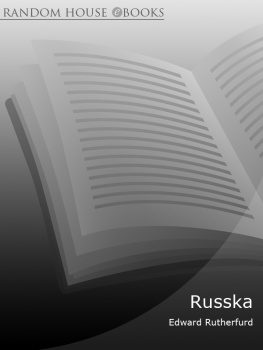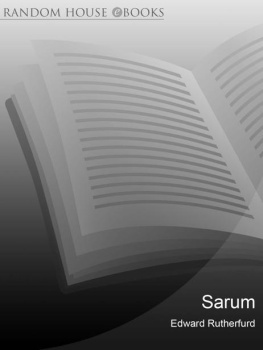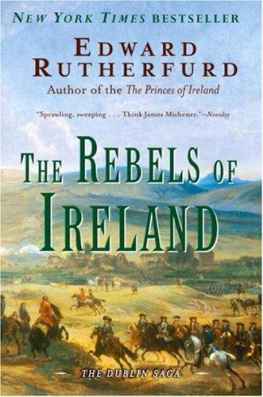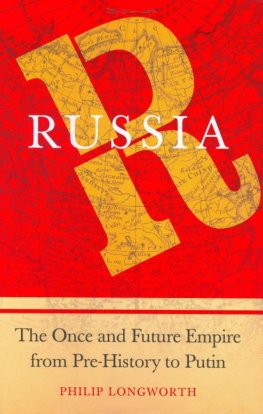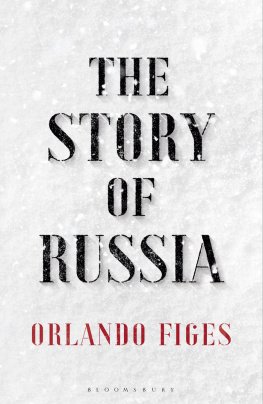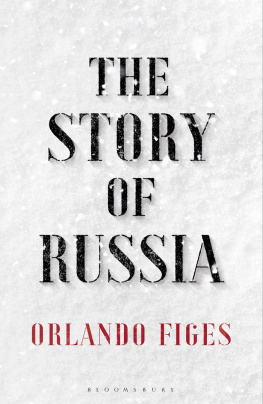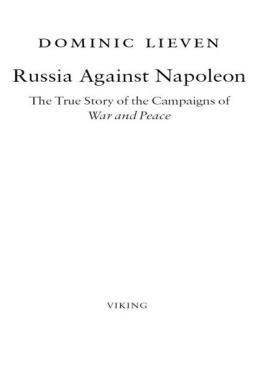RUSSKA
Edward Rutherfurd was born in Salisbury, Wiltshire, and educated at Cambridge University and Stanford University in California. His first book, Sarum was based on the history of Salisbury. London, Russka,The Forest, Dublin, Ireland Awakening and New York all draw on finely researched details of social history. Edward Rutherford has spent much of the last 30 years living in New York and Conneticut. He has an American wife and two American educated children and has served on a New York co-op board.
ACKNOWLEDGEMENTS
I am deeply indebted to Doctor Lindsey Hughes of the School of Slavonic and East European Studies, University of London, and to Miss Cathy Potter of Yale University and the University of Wisconsin who between them read the entire manuscript of this book and corrected errors. Any errors that remain, however, are mine and mine alone.
Thanks are also due to Professor Paul Bushkovitch, of Yale University, who set me upon my path.
I am most grateful to Mr E. Kasinec and the staff of the Slavonic Division of the New York Public Library; to the staff of the Butler Library at the University of Columbia; and to the staff of the London Library for their unfailing help and courtesy. Special thanks are also due to the staff at the Synod of Bishops Russian Orthodox Church Outside of Russia, New York, and the staff at St Vladimirs Seminary, Crestwood, who helped me to obtain many books.
Thanks are also due to Mr John Roberts, who kindly provided me with helpful contacts and to Mr Vladimir Stabnikov of the Writers Union in Moscow, who greatly facilitated my travels in Russia and gave much useful advice and encouragement. I am grateful also to the staff of the Hermitage Museum in Leningrad who so kindly arranged private tours for me.
There are also many other people, too numerous to mention here, both in the west and in the USSR who, in a private capacity, gave me great help and hospitality for which I shall always be very grateful.
I am most fortunate in having an agent, Gill Coleridge, and two editors, Betty Prashker of Crown Publishers and Rosie Cheetham of Century, whose patience, encouragement and unstinting help made this book possible.
I am deeply grateful to my wife Susan for her kindness and patience during the long process of this books gestation. And once again, special thanks are due to Alison Borthwick for her expert map.
Finally, I should like to express a special debt to the Archimandrite and monks of the monastic community of Optina Pustyn, for affording me an unforgettable glimpse of Russia.
Forest and Steppe
AD 180
The steppe was quiet that night. So was the forest.
Softly the wind moved over the land.
In the hut one of six that nestled together in the little hamlet by the river the sleeping mother lay with her child.
She had no sense of danger.
High in the starlit summer sky, pale clouds passed from time to time, drifting in a leisurely procession, glowing softly in the reflection of a crescent moon that rode to the south.
Like horsemen they came from the east with their billowing white canopies, from who knew what endless steppes sweeping majestically over the little collection of huts by the rivers edge and continuing their journey behind the hamlet over the dark forest which, very likely, was also without end.
The hamlet lay on the south-eastern bank of the stream. There, the woods of oak and lime, pine and birch, grew thinner, gradually giving way to glades and the broad stretches of open grassland that were the edges of the mighty steppe. Across the small river, on the north-west bank, the forest was thick, dark and unbroken.
The three families who inhabited the place had arrived five summers before, and finding there an ancient, deserted earthwork enclosure overgrown with scrub, had cleared it, put up a wooden palisade on the low earth wall, and built half a dozen huts inside. Nearby, two large fields cut untidy swathes into the trees. Further into the woods, a messy patchwork of smaller clearings appeared.
A few hundred yards downstream, the land on both sides became marshy, and remained so for a couple of miles.
Softly the wind moved over the land. It caressed the tops of the trees, so that the light undersides of the leaves shimmered pale in the starlight. The waters of the winding river and the marsh glimmered in the woods.
There were few sounds except for the gentle stirring of the leaves. Here and there, the sound of small animals, or of the deer quietly walking, might be heard. At a certain point near the marsh, against the monotonous background of the frogs croaking, an attentive ear might have picked up the crackling sounds of a bear making its way along the woods edge. But by the hamlet, the only sound was that of the leaves, and the intermittent rustle as the breeze stroked the long field of barley, sending a ripple like a momentary shiver down its length.
The wind moved, yet did not move. For sometimes the field stood still, or swayed in another direction, as though the wind from the east had paused, lazily, before brushing the ripened barley once again.
It was the year AD 180 and yet it was not. That is to say, although future times would give to this year such a number, as yet the Christian calendar was not in use. Far south, in the Roman province of Judea where Jesus of Nazareth had lived, learned Jewish rabbis had calculated that it was the year 3940 AM. It was also the one hundred and tenth year since the destruction of Jerusalem. Elsewhere in the mighty Roman Empire, it was the twentieth and last year of the reign of Marcus Aurelius, also the first year of the single rule of Commodus. In Persia it was the year 491 of the Seleucid era.
What year was it here then, in the tiny hamlet at the forests edge? So far as history is aware, it was not any year. It was five years since the last village elder died. The huge systems of numbering familiar to the civilized world, and kept in written texts, were unknown here. Even if they had been known, they would have been meaningless.
For this was the land that would one day be known as Russia.
Softly the wind moved over the land.
She lay with her little boy. The worrying thoughts of the day before had passed from her mind in sleep like the pale clouds receding over the forest behind the river. She slept at peace.
There were twelve people sleeping in the hut. Five of them, including Lebed and her child, lay on the broad shelf that ran across the room over the big stove. On this warm summer night the stove was unlit. The air was thick with the sweet, earthy smell not unpleasant of folk who have worked all day in the field harvesting. To this was added the fresh scent of grasses carried in by the breeze through the square, open frame of the window.
She lay at one end of the wooden shelf a lowly position because she was the most junior of her husbands wives. She was twenty-seven, no longer young. Her face was broad and her body had already developed a stocky roundness at the hips. Her thick fair hair had slid over the edge of the shelf.
Beside her, in the curve of her plump arm, lay a little boy of five. She had had other children before him, but they had died, and so he was all she possessed.
She had been fifteen when she married and she had always known that her husband had only taken her because she was strong: she was there to work. But she had few complaints. He was not unkind. Still a tall, good-looking man at forty, his weather-beaten face had something soft, even wistful, about it and usually when he saw her, his light blue eyes would gleam with a gentle, mocking amusement as he called: Here comes my Mordvinian.
With him, it was a term of affection. With the others, however, it was not.

